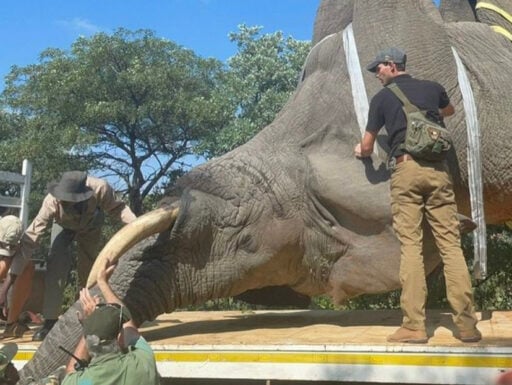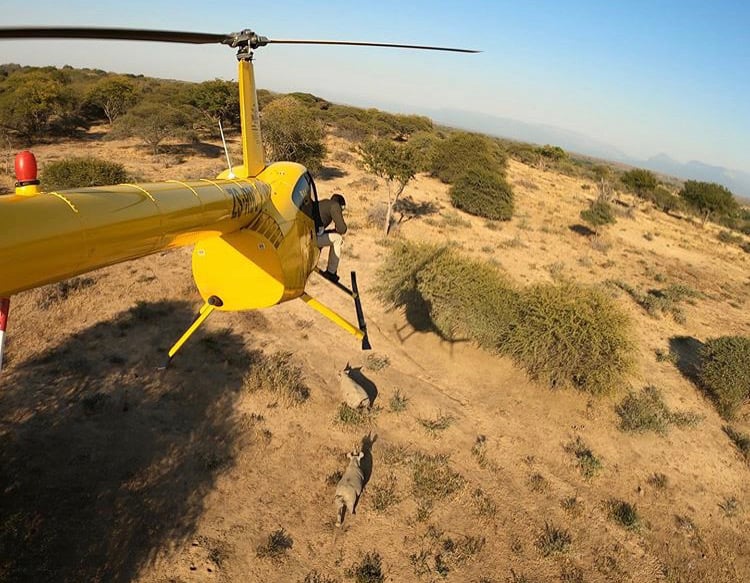
Rhino De-Horning, Elephant Collaring, and African Wildlife Medicine
Join Dr Chloe Buiting in the field for a South African Wildlife Conservation Mission in the world-famous Greater Kruger National Park. Participate in rhino dehorning and elephant collaring to protect these animals from relentless poaching attacks for their horns, and track their movements in real-time for conservation purposes.
Only 11 places are available on this 7-day training project – veterinarians, vet techs, veterinary nurses, clinical year vet students and individuals with a conservation background are invited to enroll. If you do not fit in one of these categories but have significant work experience in conservation or animal welfare and feel that this is the project for you, please contact [email protected] to discuss. Please note that this program is not open to undergraduate students or vet students prior to clinical year; we are not able to offer exceptions for students prior to their clinical year of vet school.
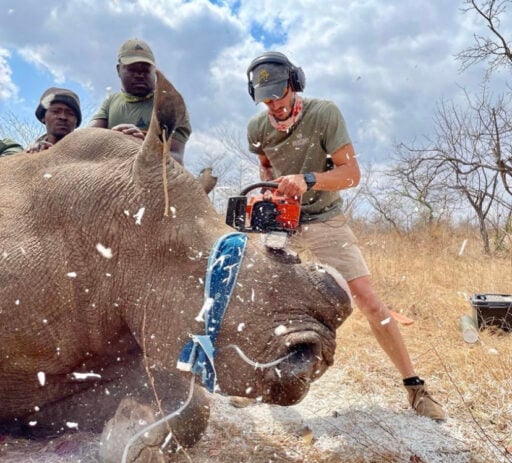
Summer 2024
July 14 – 21, 2024
August 4 – 11, 2024 – FULL WAITLIST ONLY
This is an exclusive opportunity for veterinary professionals, clinical year students and conservationists to join Dr Chloe and our team for a rhino dehorning and elephant collaring mission in South Africa this July, offering hands-on experience on the front-line of wildlife conservation.
This is a specially commissioned project, offered exclusively through Loop Abroad, and will involve a week-long intensive wildlife conservation mission on a selection of game reserves around the stunning town of Hoedspruit, near Kruger National Park. In addition to working with a variety of African species, you will also be participating in rhino dehorning, which is an emergency intervention currently underway in a desperate bid to protect the species’ from extinction. With a rhino poached, on average, every 16 hours, time remains of the essence for these animals, and dehorning has become a critical part of their conservation. Select rhinos will also be fitted with a LoRA Tracking Collar in order to provide high resolution movement data which will aid reserve management in better protecting their rhinos and developing a better understanding of their local ecology.
You will also have the rare opportunity to participate in an elephant collaring, which is only performed a handful of times a year on the entire African continent. This work and information it provides allows us to track elephants in real time and directly contributes to their conservation – be it in better understanding elephant movements and targeting conservation efforts in these areas, or offering the opportunity to intervene prior to potential episodes of human-wildlife-conflict.
You will be joining Dr Chloe and an experienced wildlife veterinary team to participate in this project. The animals will be darted from helicopters and captured by the ground team (including you!). Practical workshops and a short lecture series will equip you with the skills and knowledge required to ensure a hands-on and impactful week in the field irrespective of your level of experience.
South Africa has seen a spike in poaching during the pandemic, and measures like dehorning are a necessary part of ensuring the species survival against relentless – and often daily – attacks.
This project is a direct effort to conserve these species on the brink of extinction while allowing participants to train with experts in the field. Participants program fee provides essential support to the mission of rhino and elephant conservation.
$4,950 USD per person. Your program fee pays for all the supplies, personnel, and other costs necessary to carry out this dehorning mission – thank you!
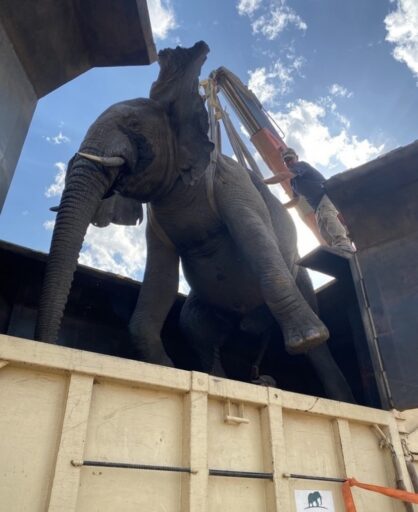
Program fee does not include:
Please note: This is a field project that takes place in a rustic area of South Africa. Housing is limited. Participants will be housed with other participants of the same gender in chalets with two bedrooms each. If you are enrolling with a friend or partner and would like to room together, please advise and we will do our best to accommodate.
For programs starting after August 20, 2023, COVID-19 vaccinations are recommended, but they will no longer be required.
All participants must follow the Loop Abroad COVID policies, which include testing negative 2 days before travel, reporting symptoms if they arise during the program, masking or testing if asked to by staff, and isolating if you test positive.
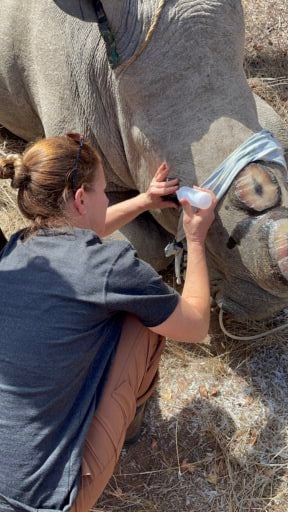
Veterinarians, vet techs, veterinary nurses, and clinical year vet students may directly enroll. Others interested in participating may email [email protected]. We cannot admit undergraduate students or vet students who are not in their clinical year to this program.
Please note that this is an active, outdoor program that requires participants to be able to walk outdoors, get safely in and out of vehicles, and be safely able to participate in working with animals outdoors for a full day.
Program Airport: Hoedspruit Airport
Accommodation:
You will have exclusive lodging in chalets at Paris Bush Camp Route 40, which is on a private wildlife reserve just outside Kruger National Park. “Chalets” are small, safari-style buildings with two bedrooms each, a private bathroom, central living area and outside deck looking onto the bush.
Central shared facilities include kitchen and dining area, sundowner deck, outdoor firepits and a small swimming pool.
Room description:
Each chalet can host 2 – 3 people, which you will be sharing with a participant of the same gender. You may request specific roommates if traveling together.
The chalets are all equipped with electricity, WiFi and private bathrooms.
Program Itinerary
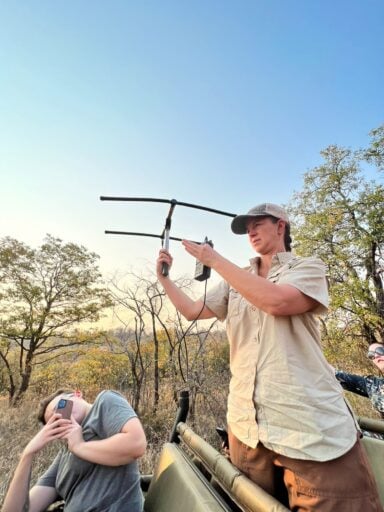
You’ll receive training in darting practicals, including an opportunity for you to practice from the helicopter.
Your participation will not only provide you with intensive hands-on experience, but you will also learn first-hand techniques in darting, immobilization, capture, anesthesia monitoring, dehorning and other topics related to African wildlife medicine – all in the heartland of African wildlife conservation. Your participation fee will directly fund the mission and work being done – from the helicopter, to vet work, drugs, dehorning licenses and the physical elephant collar – which is something we hope you can take a lot of pride in.
In our theoretical classes, we will also explore the complex topics around poaching, including what factors are driving the demand for rhino horn and the challenges we face in addressing and controlling these. We will also examine the current projects involved in the protection of the species – including ways in which you can become more involved yourself.
Itinerary
| Day | Activity |
| Sunday |
|
| Monday |
|
| Tuesday |
|
| Wednesday |
|
| Thursday |
|
| Friday |
|
| Saturday |
|
| Sunday |
|
Exact itinerary subject to change
“Vet Talks” lecture series:
